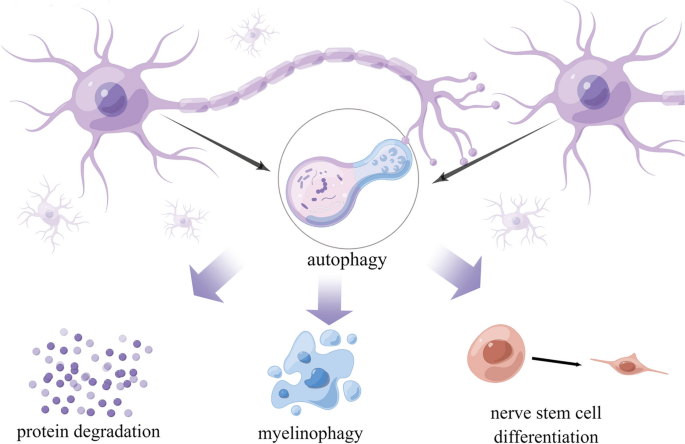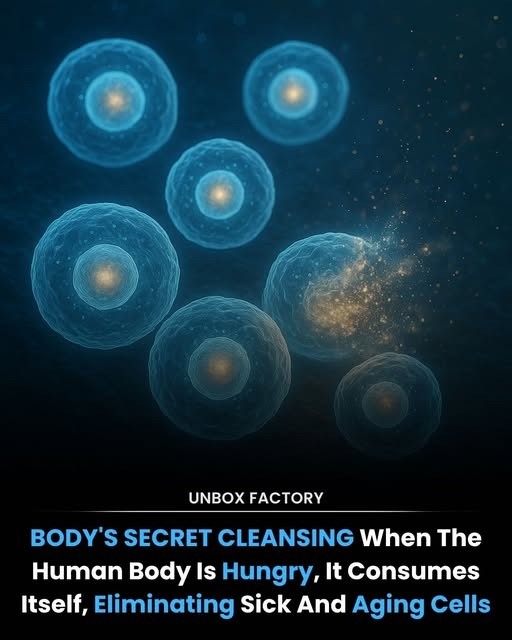Understanding the Body’s Internal Repair System
Scientists have long known that the human body has remarkable self-healing capabilities. One of the most fascinating examples of this is autophagy, a process that literally means “self-eating” in Greek. While the name may sound unsettling, the mechanism behind it is one of nature’s most sophisticated ways of keeping us healthy.
Autophagy is the body’s built-in cleaning and recycling system. It works by identifying and breaking down old, damaged, or unnecessary cells and turning their components into new energy or building materials. In simple terms, it’s the body’s way of cleaning house — removing cellular “junk” so new, healthy cells can thrive.
This process doesn’t just keep our cells clean; it also supports overall health, energy balance, and longevity. And one of the most effective ways to trigger autophagy is through fasting — giving the body a break from constant food intake.

What Is Autophagy and How Does It Work?
The word “autophagy” comes from the Greek roots auto (self) and phagein (to eat). It describes how cells digest and recycle their own components. Under normal conditions, cells accumulate waste and damaged proteins over time. If these materials are not cleared away, they can interfere with cellular function and contribute to aging or disease.
When autophagy is activated, special structures inside the cell, called autophagosomes, surround the damaged material and transport it to the lysosome, where it is broken down into simpler molecules. These molecules are then reused to create new proteins and cellular components.
This recycling process helps maintain balance, prevent cell damage, and support the body’s natural renewal system. Scientists consider autophagy essential for cell survival, growth, and adaptation to stress.

The Role of Fasting in Activating Autophagy
Research shows that autophagy is naturally stimulated during times of nutrient deprivation — such as fasting. When the body runs low on external fuel from food, it switches into a self-sustaining mode, using stored resources more efficiently. This includes recycling damaged cells and using them as a source of energy.
Most studies suggest that autophagy begins to increase after about 12 to 16 hours of fasting, depending on individual metabolism and activity levels. This is one reason why intermittent fasting — alternating periods of eating and fasting — has become a popular approach to support metabolic health.
It’s important to note that fasting should always be approached safely and may not be suitable for everyone, especially those with certain medical conditions or nutritional needs. Consulting a healthcare professional before making dietary changes is always recommended.
The Nobel Prize Discovery That Changed Cell Biology
Autophagy gained global attention in 2016 when Dr. Yoshinori Ohsumi, a Japanese cell biologist, was awarded the Nobel Prize in Physiology or Medicine for his groundbreaking work on this process.
Through decades of research using yeast cells, Dr. Ohsumi discovered the genes responsible for controlling autophagy and explained how cells use it to adapt to stress, starvation, and aging. His findings provided a detailed understanding of how cellular recycling supports life — and how its disruption can contribute to diseases such as neurodegeneration and cancer.
Dr. Ohsumi’s work opened a new field of study in medicine and molecular biology, helping scientists understand how cellular maintenance is linked to long-term health and resilience.
Health Benefits Linked to Autophagy
While autophagy is not a “miracle cure,” it plays a vital role in maintaining health on a cellular level. Scientific research continues to uncover the ways in which this process contributes to wellness. Some of the potential benefits include:
1. Cellular Renewal and Longevity
By removing damaged cell components, autophagy helps slow down cellular aging. It allows the body to replace old parts with new ones, keeping tissues and organs functioning efficiently.
2. Metabolic Balance
Autophagy supports healthy metabolism by improving how cells use energy and manage waste. Some studies suggest it may play a role in maintaining healthy blood sugar levels and cellular energy balance.
3. Immune System Support
Autophagy also helps the immune system by breaking down harmful pathogens and cleaning up infected or damaged cells. This process supports the body’s ability to respond to stress and infection effectively.
4. Brain and Nerve Health
Researchers are studying the link between autophagy and neurological health. Proper cellular recycling helps protect neurons from damage and may play a role in maintaining cognitive function as we age.
5. Skin and Tissue Regeneration
Autophagy contributes to skin renewal by encouraging the turnover of old cells and promoting the formation of new, healthy ones. This natural process supports skin elasticity and repair.
It’s important to emphasize that while autophagy supports overall cellular health, it should not be viewed as a substitute for medical treatment or professional healthcare.
Intermittent Fasting and Lifestyle Approaches
Many modern wellness practices are designed to gently activate autophagy without extreme fasting or deprivation. Common methods include:
-
Intermittent fasting: Alternating periods of eating and fasting, such as the 16:8 method (16 hours fasting, 8 hours eating).
-
Exercise: Physical activity naturally encourages mild stress that stimulates autophagy in muscles and other tissues.
-
Adequate sleep: Rest allows the body to repair and maintain healthy cellular activity.
-
Balanced diet: Eating nutrient-rich foods with antioxidants, fiber, and healthy fats supports efficient cellular function.
Adopting these habits gradually can enhance overall health and energy while giving the body the time it needs to repair and renew itself naturally.
The Future of Autophagy Research
The study of autophagy is one of the fastest-growing areas in modern biology. Scientists are investigating how this process could be used to better understand diseases such as Alzheimer’s, Parkinson’s, diabetes, and cancer, as well as how to harness it safely through diet, exercise, and medicine.
While researchers are still exploring the full therapeutic potential of autophagy, one thing is certain — it reveals the incredible intelligence of the human body and its ability to sustain itself through balance and adaptation.
Respecting the Body’s Natural Wisdom
Autophagy serves as a reminder that the body is not simply a machine that needs constant external repair — it is a self-regulating system capable of renewal and restoration. When we allow it the time and space to do its work — through rest, balanced nutrition, and mindful habits — it can perform at its best.
Taking care of your health doesn’t always mean adding more; sometimes it means giving your body a break. By supporting autophagy naturally, we empower the body’s built-in mechanisms for cleansing, healing, and growth.
Conclusion
Autophagy is more than just a scientific discovery — it’s a reflection of how deeply interconnected our biology is with lifestyle, nutrition, and overall well-being. Through the pioneering work of scientists like Dr. Yoshinori Ohsumi, we now understand that fasting and cellular recycling are essential components of health that have been part of human biology all along.
While more research is needed to fully understand all its effects, one truth stands firm: the human body is remarkably intelligent. When supported properly, it has the power to renew, repair, and restore itself from within — proving that nature’s best healer might already be inside us.
Sources
-
Nobel Prize Official Site — The Nobel Prize in Physiology or Medicine 2016: Yoshinori Ohsumi
-
National Institutes of Health (NIH) — Mechanisms of Autophagy and Cellular Renewal
-
Harvard Health Publishing — Intermittent Fasting: Benefits and How to Do It Safely
-
Nature Reviews Molecular Cell Biology — Autophagy in Human Health and Disease
-
Mayo Clinic — Understanding the Science of Fasting and Metabolic Health

